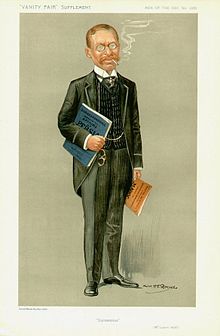Lucien Wolf
| Lucien Wolf | |
|---|---|

"Diplomaticus"
Wolf as caricatured in Vanity Fair, December 1911 |
|
| Born | 1857 |
| Died | 1930 (aged 72–73) |
| Nationality | British |
| Other names | Diplomaticus (pseudonym) |
| Occupation | Journalist, Historian, Diplomat |
| Known for | Authority on anti-Semitism |
Lucien Wolf (1857 in London – 1930) was an English Jewish journalist, historian, and advocate of Jewish rights.
He was the son of Edward Wolf, a London pipe manufacturer, and his wife Céline (born Redlich). Wolf's father was a Bohemian Jew who came to England as a political refugee after the 1848 revolution, and his mother was Viennese.
Wolf began his career in journalism as early as 1874, at the age of seventeen, becoming a writer for the Jewish World and remaining at this position until 1894; from 1905 to 1908, he would later serve as its editor. In 1877, he became assistant director of the Public Leader. From 1890 to 1909, he was foreign editor of the Daily Graphic, writing under the pseudonym Diplomaticus. From 1895 to 1905 he wrote under the same pseudonym for the Fortnightly Review. As indicated by his pseudonym, Wolf's writings dealt primarily foreign affairs and diplomacy and he became a respected expert in these fields.
The outbreak of the anti-Jewish pogroms in Russia in 1881 sparked his interest in Jewish affairs. He became a sharp critic of the Czarist regime and attempted to draw attention to the plight of Russian Jews. In 1912, Wolf founded and wrote a supplement named Darkest Russia to the Jewish Chronicle. With the outbreak of World War I, Wolf's preference for the more liberal German government to the Russian practically ended his career in journalism, as the British were allied with Russia against Germany.
Wolf was an enthusiast for Jewish history, and promoting Jewishness. In London he organized the 1887 Anglo-Jewish Historical Exhibition charting the immigration of Jews to Britain from across Europe over the centuries. In 1893, Wolf was one of the founders and the first president of the Jewish Historical Society of England. Wolf's historical writings rarely extended beyond the aristocracy, exhibiting his own upper-middle class pretensions. Against racial anti-Semitism, he championed Judaism, even offering eugenic justifications for its superiority. Fascinated by the emancipation and liberal enlightenment of Jewry he contacted Theodor Herzl, the German leader of World Zionism, when he came to London for the First Congress in 1896. Wolf was already an established joiurnalist for the most significant newspaper the Jewish Chronicle.
...
Wikipedia
